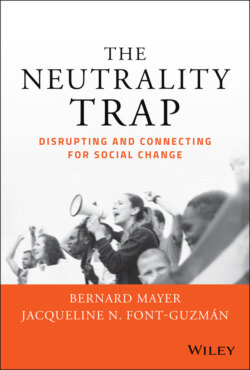Читать книгу The Neutrality Trap - Bernard S. Mayer - Страница 16
Disrupting Systems of Oppression
ОглавлениеChallenging systems that perpetuate oppression can be overwhelming, especially for those who bear the brunt of the oppression and may feel simultaneously responsible for advancing change and disempowered—a dilemma that Emily Martin (1994, 122) has called “empowered powerlessness.” Where to even begin? And once we disrupt the system, what is next? How do we move from awareness to disruption and then to change?
Recognizing the importance of disruption is an important first step in refocusing from system maintenance to social change. Disruptions can be overt and group based, such as organizing social movements, unionizing, or taking to the streets to demand change. Other approaches are more individual, such as calling in someone when they engage in a microaggression (an exchange that denigrates and insults a specific person or group (Sue 2010, 5)), kneeling for a national anthem, writing an op‐ed, or raising concerns about implicit bias with colleagues or managers.
Disruption is successful when it calls attention to routinized acts of violence and oppression and causes systems to reorganize in a way that limits or eliminates these acts. Sometimes when we challenge everyday microaggressions, we interrupt the normalization of the assumptions, prejudices, and injustices that enable such aggressions and, in doing so, we may create openings for dialogue where we thought none were possible (Cohen and Strand 2021).
During the summer of 2019, I (Jackie) joined Puerto Ricans who, for 14 days, took to the streets with a self‐organized movement that ousted Ricardo (Ricky) Rosselló, the governor of Puerto Rico. Rosselló announced his resignation on July 24, 2019, one day after close to a million people (a third of Puerto Rico's population) shut down the island by occupying the main expressway in San Juan and demanded his resignation.
The tipping point for this insurrection was the publication of 889 pages of texts from a messaging app administered by Rosselló. The chat included his closest advisers, a lobbyist, and cabinet members—all 12 of whom were men. The chat contained expletive‐laced attacks on the LGBTQIA+ community, women, obese individuals, the 4,645 people who died during Hurricane María, political opponents, members of the governor's own political party, journalists, and the poor. Rosselló became a symbol of the corruption, inequity, and colonial oppression that has plagued Puerto Rico for centuries. This protest was a manifestation of a conflict rooted in over 500 years of colonization, embedded in Puerto Rico's complex interactions with the United States, and wrapped in the island's national identity and cultural values.
Puerto Ricans' expression of their culture gave life, power, and unity to the movement. Puerto Ricans ousted the governor through dancing, painting, poetry, acrobatics, kayaking, scuba diving, skydiving, singing, motorcycling, horseback riding, biking, pot banging, kite flying, improvisational comedy—and more. The arts and humanities took over the land, water, air, and space in Puerto Rico.
We have seen similar efforts to confront oppression and authoritarianism in Hong Kong, Myanmar, Chile, Russia, and elsewhere. In each case, the pushback was significant and has led to violence, mass arrests, and an increase in the repressive nature of the regime.
In the face of such ferocious resistance, it is easy to become disillusioned about the possibility of progress against oppression. These upheavals are manifestations of how in the face of enduring conflicts creative approaches to conflict escalation can move systems toward democracy and inclusion. But progress does not occur in a neat, linear, unidirectional way, and we can hold no certainty about end results or unintended consequences.
Of course, not all social movements are aimed at confronting oppression or injustice. Some movements (e.g. the Tea Party or the Proud Boys) are intended to maintain privilege and dominance. The efforts to subvert the outcome of the 2020 presidential election in the United States were the expression of resistance to the empowerment of women and minorities. The struggles between progressive and regressive forces are ancient and enduring, and the struggle for justice is powerful but not straightforward.
